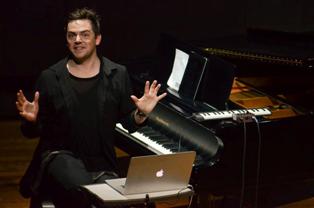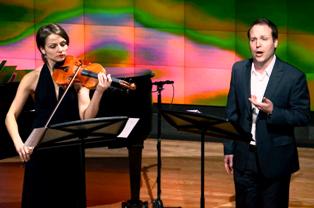http://www.cincinnati.com/article/20131011/ENT03/310110114/
Posted: Oct 13, 2012 - 7:01:46 PM in reviews
(first published in The Cincinnati Enquirer Oct. 12, 2010)
Centerpiece of the program was “The Unknown Room,” a setting of surrealist love poems by Andre Breton and Jacques-Bernard Brunius (“Always for the First Time” and “I Love,” respectively). Opening electronically on a soft, stark interval – Muhly manipulated the electronic elements throughout the concert -- it transpired as a dialogue between Knox and Berman over drones (long repeated tones). The two poems, the first drenched in longing, the second upbeat and hopeful, were separated by a dramatic, sorrow-filled mid-section for solo violin, insightfully and beautifully performed by Berman. Lines from the poems were interspersed with Munson’s atmospheric projections, which keenly reflected Knox’s heartfelt vocalism.
 Jean-Yves Thibaudet - Provided
Jean-Yves Thibaudet - Provided
When I shared that observation, his response was an enthusiastic “Yeah!”
THE CONSTELLA FESTIVAL runs through Nov. 6. Tickets and information: constellafestival.org.
http://www.soapboxmedia.com/features/062612tatianaberman.aspx
http://www.musicincincinnati.com/site/reviews/Berman_and_Lopez_Gifts_to_Cincinnati.html
Constella Festival of Music and Arts - Press
City Beat Article
musicincincinnati.com
Express Cincinnati
Constella presents huge variety of stars
www.cincinnati.com
PRESS QUOTES
“Tatiana’s performance was full of nuance and subtle contrasts imbued with real communication. She gripped the attention with the beauty of her warm-toned playing in the opening bars and never allowed it to slacken as she demonstrated her technical accomplishment in the most taxing passages. In the many exposed solo sections one could savor her distinctive musicianship.”
Review: Berman, Järvi deliver stunning world premiere performance
0 Comments
Tatiana Berman: 'Music and art drive me': Tatiana Berman, the founder of Cincinnati's Constella Festival, takes us inside her East Walnut Hills condo for a tour of her art and a musical performance
Written by
Janelle Gelfand
It’s no mean feat to direct a music festival and also star as the soloist in a world premiere performance.
But multi-tasking violinist Tatiana Berman, who is also founding director of the Constella Festival of Music and Fine Arts, delivered impressively in both areas in Thursday’s festival program entitled “Queen City Connections.”
Indeed, there were multiple Queen City connections in play. Returning to conduct was Paavo Järvi, music director laureate of the Cincinnati Symphony Orchestra, and Berman’s former husband.
Filling every inch of Memorial Hall’s stage, the chamber-sized orchestra included a number of members of the Cincinnati Symphony. And the collaborating composer, Charles Coleman, has strong ties to the Cincinnati Symphony, which has premiered and recorded several of his pieces.
Järvi’s program included Stravinsky’s ballet score “Apollon Musagète” and Mozart’s Symphony No. 33 in B-flat Major, K. 319. The main event, Berman’s premiere of Coleman’s Violin Concerto, came last.
It was worth the wait. Coleman, born in New York in 1968, writes in a style that is vibrant and urban – it is music of today. His substantial, three-movement Violin Concerto combined minimalist techniques (the repetition of motives and rhythms) and a romantic gift for melody.
The piece was instantly appealing. The first movement opened with a long, sinuous melody for the violin in a duet with a cymbal. It evolved into a palette that was bright and busy, with bubbling winds set against glowing orchestral textures. Berman crouched as she tackled its soaring, angular themes with a seamless, lyrical tone.
The slow movement was atmospheric, with soulful themes for the violin and lush orchestral accompaniment. Its ebb and flow included a brief nod to jazz, and a Mozart-like wind ensemble. As the orchestra played a sustained river of sound, the violinist’s tones floated above. A captivating clarinet solo (Jonathan Gunn) had the last word.
The finale was an edgy perpetual motion, with the violinist interjecting both long melodies and rapid figures. Järvi and the musicians supported the soloist well, although here, perhaps due to the hall’s boomy acoustics, the violinist didn’t project as well.
Berman’s playing was top-notch, and she ended with a flourish. As the crowd stood for an enthusiastic reception, the couple’s two little daughters delivered bouquets to their parents.
Järvi opened with Stravinsky’s rarely-played, neo-classical “Apollon Musagète” (Apollo, leader of the Muses), a ballet in two scenes for strings.
Written for the impresario Diaghilev in 1928 (Järvi led the 1947 revision), it is basically a suite of dances. Its movements are variations for three muses, framed with variations for Apollo and ending with a delicate pas de deux.
It was by turns austere and lush, and there were many stunning moments. Concertmaster Anna Reider performed an elegiac solo with immense beauty of tone, and string sonorities were rich. Järvi found character in each of its movements, and the musicians responded with terrific playing.
That sense of discovery continued in the Mozart, notable for its momentum, lightness and detail given to every phrase. Nothing was predictable, and even though this was a “pick-up” orchestra, Järvi knew just how to bring out the best in his players.
Downstairs at Memorial Hall, the Constella event included a casually displayed exhibition of art by pop artist Andrew VanSickle, outsider artist The Rev. Howard Finster and celebrity photographer Gary Lee Boas.
The Constella Festival continues through Nov. 7. Information: 513-621-2787, www.constellafestival.org.
http://www.musicincincinnati.com/site/reviews/Nico_Muhly_Meets_the_Digitorium.html
Nico Muhly Meets the Digitorium
Posted: Oct 13, 2012 - 7:01:46 PM in reviews

Griffin Hall, Northern Kentucky University
|

Nico Muhly at the Digitorium, Northern Kentucky University
|
Nico Muhly, 31, has been called “the hottest composer on the planet” -- and not without reason. To say that he is on the cutting edge of musical composition is no exaggeration, as a rapt crowd learned Tuesday evening (Oct. 9) in the Digitorium in Northern Kentucky University's Griffin Hall.
Composer-in-residence for the 2012 Constella Festival of Music and Fine Arts, Muhly hosted, explained and performed over an hour’s worth of mind-bending, electronically-laced musical art. Working with him was visual and electronics artist Jordan Munson, who filled the 285 micro tiles on the wall of the Digitorium with light, color and abstract imagery.
The music was all-Muhly, including a world premiere, “The Unknown Room,” featuring violinist/Constella artistic director Tatiana Berman and tenor Grant Knox. Also on the program were “Keep in Touch” with Joanne Wojtowicz on amplified viola, a set of pieces with Muhly at the piano and a choral work, “Like as the Hart,” performed by the NKU Chamber Choir conducted by Randy Pennington.

Tatiana Berman and Grant Knox performing at Digitorium at Northern Kentucky University
|
Wojtowicz “plugged in” her viola for “Keep in Touch,” which Muhly introduced in droll, viola-joke fashion: “What could I possibly do with a viola?” Quite a lot, actually. Muhly describes it as a lament, cast loosely in the form of a chaconne (a baroque form based on a repeated cycle of chords). The electronic element consisted of a pre-recorded CD, featuring vocalist Antony Hegarty (of Antony and the Johnsons) whose androgynous sound is intended to reflect the viola’s position as the “in between” voice of the violin family. It was a fascinating work, with percussive, even violent effects, as well as ecstatic ones, ambiguous faces on the Digitorium wall and Muhly ever-busy coordinating the electronics on his laptop computer.
The concert opened with “The Adulteress,” a setting of the biblical text about Jesus and the woman taken in adultery. It was the most traditional work on the program (no electronics), essentially an opera scene, given a touching rendition by soprano Samantha Stein and pianist Rosemary Ritter, with projections of blues and reds that became suffused with light at the end.
Muhly took to the piano for “Skip Town,” a rhythmically charged work with pre-recorded percussive effects, providing a sudden, brief splash of fun. He followed with “A Hudson Cycle,” a tribute to a pair of departing friends and “the saddest piece I’ve ever written,” he said. Beautiful colors were projected here, reflecting the minor-mode harmony of the work. Muhly closed the set with “Drones and Piano.” His objective here, he said, was to array sounds that surround us in daily life over a drone (in this case two notes repeated throughout). There were scratching strings, bell and organ-like sounds and some dramatic acoustic piano, requiring Muhly to address the piano with one hand and the keyboard interacting with his computer with the other.
Final work of the evening was “Like as the Hart,” inspired by Psalm 42. Violinist Elizabeth Steva and percussionist Joe Bedel performed the acoustically conceived work with 30-voice NKU Choir, who unfolded the text with slowly changing harmonies, placing the central emphasis on the word “God.” Complementing the voices were soft touches of gong, triangle and wood block and melodic fragments and figurations on the violin.
The concert was followed by a reception and art exhibit by Andrey Kozakov in the lobby of the Digitorium. The Constella Festival continues at 8 p.m. tonight in Patricia Corbett Theater at the University of Cincinnati College-Conservatory with the Café MoMus Contemporary Music Ensemble performing more Muhly. Admission is free.
http://www.citybeat.com/cincinnati/article-26257-the_stars_align.html
The Stars Align
Constella Festival’s second season kicks off with diverse performances featuring local and international artists
BY ANNE ARENSTEIN · OCTOBER 3RD, 2012 · CLASSICAL MUSIC Jean-Yves Thibaudet - Provided
Jean-Yves Thibaudet - Provided
The Constella Festival embarks on its second season with stats that veteran music organizations would envy: a lineup of world-class performers, growing and diverse audiences and a budget in the black.
Festival founder and artistic director Tatiana Berman might be diminutive in stature, but when it comes to Constella, she’s herculean. Constella’s season offers an abundance of wildly diverse performances featuring international and local artists in venues throughout downtown Cincinnati and Northern Kentucky. Met Opera clarinetist Anthony McGill opened the festival and captivating pianist Jean-Yves Thibaudet closes out the festival next month. Veteran Jazz trumpet player Lew Soloff, violinist Anne Akiko Meyers, composer/pianist Nico Muhly, the Exhale Dance Tribe and an evening of opera round out the schedule.
“I think the curation is just right,” says Muhly, speaking from Los Angeles. “Each evening has a focus. When it’s one artist, the program is what that artist wants to do.” It’s also a festival where fun is an operative word, especially for Muhly and Jean-Yves Thibaudet.
Muhly will be in town for the world premiere of “Organically Charged,” a multimedia composition with Muhly at the piano in NKU’s state-of-the-art Digitorium. A composer, performer, conductor and arranger, Muhly has a dazzling resume of commissions and collaborations, ranging from major orchestras, opera and ballet companies to Grizzly Bear and Usher. He describes his newest piece as “texts taken from a variety of sources, all happening at the same time.”
“Organically Charged” is accompanied by voices, acoustic instruments, pre-recorded electronics and visuals created by artist Jordan Munson, a pioneer in digital and computer imagery. Muhly calls the images “a process that’s visible and invisible, abstract enough that you can ascribe your own meaning. It’s going to be a great evening, a lot of fun.”
He’s eager to return to Cincinnati, noting the diversity of audiences “and how much great music-making is happening. The musicians I worked with were so excellent.” NKU students, along with Berman, violist Joanne Wojtowicz and tenor Grant Knox, will be part of the ensemble.
Piano phenom Jean-Yves Thibaudet is as noted for his fashion sense as he is for the sheer joy and fearlessness he brings to each performance, qualities that came through in a phone conversation last week.
When I shared that observation, his response was an enthusiastic “Yeah!”
A seemingly tireless performer, Thibaudet’s appearance is a fortunate conjunction of a cancellation that coincided with Nov. 6, when he performs at Memorial Hall. Commemorating the 150th anniversary of French composer Claude Debussy’s birth, Thibaudet will play an all-Debussy program (“one of my two favorite composers,” he says). Thibaudet is an extraordinary interpreter across the piano rep but his grasp of Debussy, Ravel and Satie is beyond category. If you love Debussy’s “Claire de Lune,” you can’t miss this recital.
Thibaudet shares Nico Muhly’s commitment to audience involvement. “The music energizes me. You’ve been given a talent and you just have to share it with people.”
Performing on election night should add a frisson to evening. Thibaudet assures me “I’ll make sure everyone in the audience has voted.”
In addition to Constella concerts, there are 11 partner events, presented by area ensembles and institutions; everything from the Blue Wisp Big Band to Bi-Okoto African Dance Company, Cincinnati Shakespeare Company, Classical Revolution, concert:nova and more.
Berman says the partner events are part of Constella’s commitment to collaboration where “everybody wins. This year, several organizations approached me, asking to participate, and I reached out to those I thought would be interesting, like Bi-Okoto.”
Season two incorporates lessons learned from last year and new ventures for this and future seasons. “We took away a lot of good lessons. One of the main things we learned was the importance of doing things in advance,” Berman notes. “We made tickets available in June as opposed to September last year, and we made sure that our partner organizations knew our schedule well in advance.”
Another lesson learned was the importance of staff and a committed board. “Good professional staff is key to professionalizing the festival,” says board president Daniel Hoffheimer. Five part-time staff, including three CCM grad students in arts administration and/or business administration, handle administrative duties. “They are all absolutely incredible,” Berman says. The five-member board is working to cultivate new members, which goes hand-in-hand with building an effective fundraising team.
“We want to free Tatiana to do what she does best: finding and bringing in top musical talent from around the world,” Hoffheimer says.
Berman always envisioned Constella as a festival on par with Aspen and Santa Fe, but for the present, she and her board have their sights on staying in the black and promoting awareness of the festival here at home.
“I’d like to achieve recognition of what Constella is and what it represents, that it features some of the best events to see and hear in the region,” Berman says. “And I want people to realize it’s here to stay.”
“We intend this year and next to be two more steps on a path to create one of America’s great music festivals in one of America’s most musically rich cities,” Hoffheimer says. “Like major festivals, Constella has ambitions to be a $20 million annual economic force, supporting restaurants, hotels and retail.”
Constella is pursuing press and tourist outlets but Berman notes that much of the buzz is through word of mouth. She points out that her Europeans colleagues know of her idea and visit the web site. “That’s the whole idea.”
When I tell Jean-Yves Thibaudet it’s Constella’s second season, he exclaims, “You’re joking! I thought it had been around for a long time.”
“I really tip my hat to her,” he adds, “Especially in these hard times, to do a music festival like this is wonderful.”
“Constella is an amazing thing,” Muhly says. “I wish we had it in New York.”
THE CONSTELLA FESTIVAL runs through Nov. 6. Tickets and information: constellafestival.org.
http://www.soapboxmedia.com/features/062612tatianaberman.aspx
http://www.musicincincinnati.com/site/reviews/Berman_and_Lopez_Gifts_to_Cincinnati.html
Constella Festival of Music and Arts - Press
City Beat Article
musicincincinnati.com
Express Cincinnati
Constella presents huge variety of stars
www.cincinnati.com
PRESS QUOTES
“Tatiana’s performance was full of nuance and subtle contrasts imbued with real communication. She gripped the attention with the beauty of her warm-toned playing in the opening bars and never allowed it to slacken as she demonstrated her technical accomplishment in the most taxing passages. In the many exposed solo sections one could savor her distinctive musicianship.”
Musical Opinion, UK
"Russian violinist Tatiana Berman gave a nearly flawless performance of the famous and popular Bruch concerto. With an assured technique, she seemed to effortlessly toss off the many chords and roulades, yet comfortably slipped into sweet lyricism when called for -- especially in the gorgeous second movement. She had a big enough sound to be heard over the orchestra."
- Spartanburg Herald-Journal (S.C.), Bruch Concerto, Spartanburg Philharmonic Orchestra, Sara Ioannides, Conductor
§ “Berman has the ability to play with the deepest intensity while avoiding any hint of shrillness or diminishing the beauty of her sound.”
§ “Violinist Tatiana Berman played with storybook expression: crisp, gritty, sweet or husky, echoing Joseph’s complex feelings and playing a blue streak when the drama escalated.”
§ “Rose in the scroll of her violin, Berman gave it a richly colored, beautifully shaped rendition -- from brightly focused to feathery to sassy -- kindled by expressive vibrato and piquant effects like scratching behind the bridge with her bow.”
www.musicincincinnati.com, Mary-Ellyn Hutton. From reviews of concert:nova, Cincinnati.
“This was playing of the first order, by someone with a mature and compelling musical personality.”
The Strad, UK
“It was a performance of a considerable musical accomplishment”
Musical Opinion, UK"Russian violinist Tatiana Berman gave a nearly flawless performance of the famous and popular Bruch concerto. With an assured technique, she seemed to effortlessly toss off the many chords and roulades, yet comfortably slipped into sweet lyricism when called for -- especially in the gorgeous second movement. She had a big enough sound to be heard over the orchestra."
- Spartanburg Herald-Journal (S.C.), Bruch Concerto, Spartanburg Philharmonic Orchestra, Sara Ioannides, Conductor
§ “Berman has the ability to play with the deepest intensity while avoiding any hint of shrillness or diminishing the beauty of her sound.”
§ “Violinist Tatiana Berman played with storybook expression: crisp, gritty, sweet or husky, echoing Joseph’s complex feelings and playing a blue streak when the drama escalated.”
§ “Rose in the scroll of her violin, Berman gave it a richly colored, beautifully shaped rendition -- from brightly focused to feathery to sassy -- kindled by expressive vibrato and piquant effects like scratching behind the bridge with her bow.”
www.musicincincinnati.com, Mary-Ellyn Hutton. From reviews of concert:nova, Cincinnati.